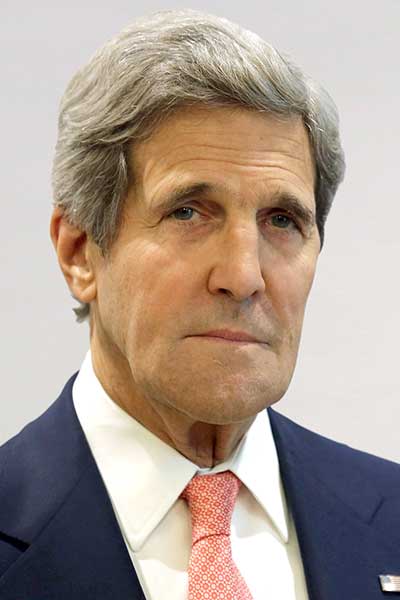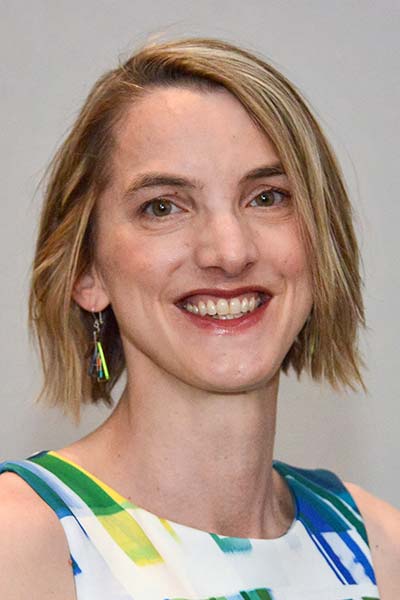Former U.S. Secretary of State John Kerry declared during ATS 2022 that climate change is a life-or-death matter and that health care workers need to begin drawing a direct line between air quality and their patients’ health issues in the clinical setting.

“A lot of people don’t see that the way in which they live — the choice they make about the type of car they drive or how they heat their home — they don’t see the connection between that, necessarily, and a visit to the hospital at some point in time,” he said.
Sec. Kerry, who now serves as U.S. Special Presidential Envoy for Climate, spoke via a pre-recorded video, with Mary Rice, MD, MPH, a pulmonologist, air pollution researcher, and former chair of the ATS Environmental Health Policy Committee, during Monday morning’s Keynote Series address.
Dr. Rice, associate professor of medicine at Harvard University, noted how the use of oil, coal, and gas impairs the health of everyone, but especially those with chronic lung conditions. Decades of research, including epidemiologic animal in vitro studies, have elucidated how fossil fuel-derived particulate matter causes oxidative stress and inflammation, not only in the lung, but throughout the body, she said.

Ozone is a powerful oxidant and respiratory irritant, and repeated ozone exposure activates the innate type 2 immunity and eosinophilic inflammation leading to airway remodeling, Dr. Rice added. She also pointed to studies that show a direct link between daily exposure to particulate matter and ozone, and child emergency room visits for asthma.
Climate change is also responsible for the increasing number of wildfires each year, she said. And those fires cause oxidative stress throughout the entire human body, just like cigarettes. The amount of pollution from the fires is immense and can contribute to respiratory mortalities from pneumonia, asthma, lung cancer, diabetes, and high blood pressure.
The U.S. Environmental Protection Agency estimates that more than a third of all particulate matter in the atmosphere comes from wildfires and that local pollution levels during fires routinely reach into the hazardous range of the EPA Air Quality Index, Dr. Rice explained.
She then turned to the recorded interview she conducted with Sec. Kerry. He began by noting that five million people die annually around the world from extreme heat caused by climate change and another 10 million die because of poor air quality. He estimated that $50 billion a year is spent in America on treating asthma, a large portion of which goes to children’s hospitalization every summer because of environmentally induced asthma.
In addition to their profound impact on health, air particulates and ozone also pollute waterways, killing fish and causing ash and sludge. This in turn impacts food production, often in places where people are already starving, which then results in climate refugees around the world who have no health care.
“We just have an enormous amount of work ahead of us to get people to understand that the climate crisis is not just some white warming that takes place in various parts of the world, that, ‘Oh, you’re just going to live in a slightly warmer place,’” he said. “It is life and death. People die in mudslides, people die in fires, people die in droughts, people die in floods. So, this has a very direct impact on our lives, and we are spending far more money to simply clean up after the mess than we are to prevent it from taking place in the first place.”
Sec. Kerry said the U.S. can be part of the solution by helping more vulnerable countries around the world, particularly small island states in the Pacific and Indian Oceans, to build early warning systems and sea walls to prevent death and devastation from storms. The U.S. also needs to help other countries build resilience in their crops, their housing, and their infrastructure to weather the effects of climate change.
COVID-19, he said, provided a valuable lesson in that when you pay attention and recognize a crisis, you can do something about it.
“That’s how we got vaccines,” he said. “We determined we were going to do what we needed to. We put money on the table. We gave people a license to go out and do these things. We accelerated the process by funding very, very quickly and in an emergency fashion. We didn’t waste years. We went right to work and we saved countless lives around the planet.”
The same approach is needed for the deployment of renewable energy, Sec. Kerry said. He stressed that some of the most valuable voices on climate change are in the health care community, because these professionals can draw a direct line between the climate crisis and the impact it has on the health of people every day.
“They are good validators,” he said. “They can talk about it from their heart, they can talk about it from their daily experience in ways that really touch people, with real stories that have real impacts.”
Dr. Rice wrapped up the presentation by noting that the ATS must lead by example and achieve carbon neutrality as a medical society. She also echoed Sec. Kerry by urging ATS members to let their patients know the impact of climate change on their own personal health and advocated for more training so they know how to communicate that message.
“Just as we may explain to a patient, ‘Your COPD is due to your smoking,’ we can say, ‘Air pollution from fossil fuel burning and climate change is irritating your airways.’ Patients need to know,” she said.
Extend Your Learning Beyond San Francisco with ATS 2025 Conference Highlights

With so many valuable educational opportunities offered during the ATS 2025 International Conference, attendees are often forced to decide which sessions to prioritize. That’s why the Society is offering three ATS 2025 Conference Highlights packages for those unable to attend ATS 2025 San Francisco or attendees interested in continuing their education after the conference. Check out the packages and pick the one that’s right for you. Learn at your own pace, whenever and wherever you are!

